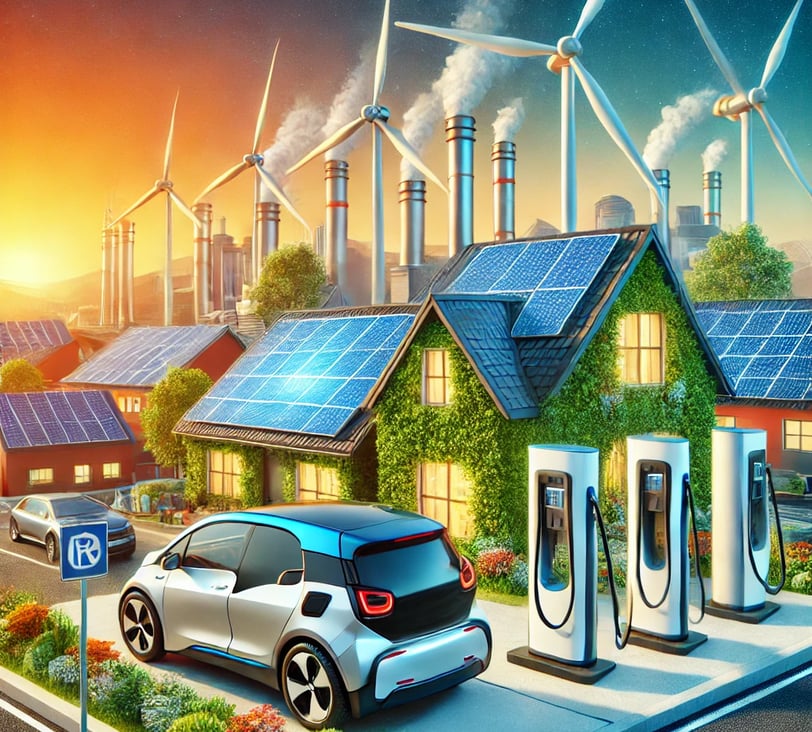Tesla's Role in Advancing Electric Vehicle Technology
Elon Musk's Tesla has been a trailblazer in the electric vehicle (EV) industry, setting new standards for performance, sustainability, and innovation. This blog post explores how Tesla is advancing EV technology and what investors can learn from its pioneering efforts.
Trent Palumbo
6/24/20242 min read


My post content
1. Cutting-Edge Battery Technology
One of Tesla's key strengths lies in its advanced battery technology. The company's continuous improvements in battery efficiency, cost, and longevity have been critical in making EVs more accessible and practical for consumers.
Key Points:
Battery Efficiency: Tesla's batteries offer higher energy density and longer driving ranges, making EVs more convenient and reliable.
Cost Reduction: Through innovations in battery design and manufacturing, Tesla has significantly reduced the cost of batteries, helping to lower the overall price of EVs.
Longevity: Tesla's batteries are designed for durability, ensuring that they last for many years with minimal degradation.
Key takeaway: Investing in companies that lead in battery technology can provide substantial growth opportunities as demand for EVs increases.
2. Autonomous Driving Technology
Tesla's Full Self-Driving (FSD) technology aims to make autonomous vehicles a reality. This groundbreaking technology enhances safety and convenience, positioning Tesla at the forefront of the autonomous driving revolution.
Key Points:
Advanced Sensors: Tesla vehicles are equipped with a suite of sensors and cameras that enable autonomous driving capabilities.
AI and Machine Learning: Tesla uses advanced AI and machine learning algorithms to improve the accuracy and reliability of its autonomous driving systems.
Safety Features: FSD technology includes features such as auto-pilot, traffic-aware cruise control, and automatic lane-keeping, enhancing vehicle safety.
Key takeaway: Autonomous driving technology represents a significant growth area, and investing in companies at the forefront of this technology can yield high returns.
3. Sustainable Manufacturing and Supply Chain
Tesla is committed to sustainability not only in its products but also in its manufacturing processes and supply chain management.
Key Points:
Gigafactories: Tesla's Gigafactories are designed to produce batteries and EVs at scale while minimizing environmental impact.
Sustainable Materials: The company focuses on using sustainable and ethically sourced materials in its production processes.
Energy Efficiency: Tesla's factories aim to be energy-efficient, using renewable energy sources to power their operations.
Key takeaway: Companies that prioritize sustainable manufacturing practices can attract environmentally conscious consumers and investors.
4. Expanding Global Presence
Tesla's global expansion strategy has enabled the company to penetrate new markets and increase its influence in the sustainable energy sector.
Key Points:
International Markets: Tesla has expanded its operations to key markets in Europe, Asia, and North America, increasing its global footprint.
Localized Production: Establishing Gigafactories in different regions helps Tesla reduce costs, improve supply chain efficiency, and cater to local markets.
Market Leadership: Tesla's market leadership in EVs and renewable energy solutions positions it for sustained growth and profitability.
Key takeaway: Expanding globally and investing in renewable energy projects can help companies achieve economies of scale and better serve diverse markets.
Recommended Reading
For those interested in Tesla's innovative strategies and contributions to sustainable energy, check out this book on Tesla and Elon Musk's vision for the future.
Amazon Affiliate Disclosure
As an Amazon Associate, we earn from qualifying purchases. This helps us provide more valuable content for our readers.
